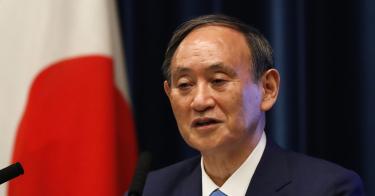In recent months, Tokyo has issued increasingly bold statements of support for Taiwan against Chinese intimidation, even hinting at military support during potential hostilities. An expanded Japanese alliance role in protecting regional security is a welcome development.
However, the extent to which Tokyo would join U.S. forces in protecting Taiwan remains uncertain, as does the ability of the habitually slow Japanese decision-making process to respond expeditiously during a crisis. U.S. policymakers should engage with Tokyo to remove political impediments to action and coordinate military contingency plans.
Japan’s increasing concern with China’s intimidation of its neighbors triggered a shift toward greater willingness to publicly align its national interests with the security of Taiwan. Last December, State Minister of Defense Yasuhide Nakayama defined Taiwan’s safety as a “red line” and urged President-elect Joe Biden to “be strong” in supporting Taiwan against Chinese aggression.
This March, Japanese Defense Minister Kishi Nobuo and U.S. Defense Secretary Lloyd Austin agreed to closely cooperate in the event of a Chinese assault on Taiwan. The Japanese ministers of foreign affairs and defense issued a statement in conjunction with their U.S. counterparts “underscoring the importance of peace and stability in the Taiwan Strait” and highlighted it as a critical interest for both countries.
>>> Vaccinating Taiwan Against Beijing’s Threats
In an April joint statement with President Biden, Prime Minister Yoshihide Suga affirmed the “importance of peace and stability across the Taiwan Strait” and “the peaceful resolution of cross-strait issues.” It was the first reference to Taiwan in a U.S.-Japan summit document since 1969. Suga was willing to criticize China by name for its belligerency in Asia, a step that South Korean President Moon Jae-in was unwilling to take in his summit with Biden a month later.
But Suga seemed to subsequently walk back hints of military support. He told the Japanese legislature that the joint statement “does not presuppose military involvement.” Suga demurred that, rather than making a sweeping statement, Tokyo would first need to consider all aspects of a given situation before reaching a final decision regarding military involvement.
Also in April, Defense Minister Nobuo Kishi visited Japan’s Yonaguni Island, less than 70 miles from Taiwan, to emphasize that the proximity of Taiwan had implications for Japanese security. He commented that Japan needs to be prepared if the island “turns red” since Japan’s security situation could change drastically. Kishi later declared that the security of Taiwan was directly linked with that of Japan.
In June, State Minister of Defense Yasuhide Nakayama called on democracies to “wake up (and) protect Taiwan as a democratic country.” Nakayama warned that a crisis there would impact Japan’s Okinawa Prefecture, which hosts the bulk of U.S. forces in Japan.
Deputy Prime Minister Taro Aso more forthrightly declared Japan would participate in the defense of Taiwan. He asserted that a Chinese invasion would be an “existential threat (to Japan) since Okinawa could be next” and would necessitate a joint Japanese-U.S. response to defend the island.
How far would Japan go to defend Taiwan? In 2015, Tokyo adopted a less restrictive legal interpretation of its right to exercise collective self-defense, enabling it to now support the U.S. military outside of Japan. However, if Japan were not directly attacked, the prime minister would still need to determine a situation threatening the nation’s survival had occurred prior to providing assistance. The recent Japanese statements appear to lay the political foundation for making such a determination if Taiwan were attacked.
Tokyo has reportedly been studying possible military responses to a conflict over Taiwan, including releasing a dispatch order to protect U.S. warships and military planes in such a conflict. Ideally, Japan would also provide logistical support and conduct transport and supply operations to U.S. forces.
Since 2019, Japan and the United States have conducted strategic planning and combined exercises in the South and East China Seas in preparation for a possible conflict with China over Taiwan. One former U.S. official said the eventual goal was for the two allies to create an integrated war plan for Taiwan.
For the first time, Japan mentioned the importance of stability in the Taiwan Strait in its annual defense white paper. Tokyo emphasized that “the stability of the situation surrounding Taiwan is important for the security of Japan and the stability of the international community. (Japan must) pay close attention to the situation with a sense of crisis more than ever before.”
>>> Time To Act on a Trade Deal With Taiwan
Kurt Campbell, White House Coordinator for the Indo-Pacific, emphasized in a public speech that the Biden Administration stood by the “One China” policy of previous U.S. administrations of not recognizing Taiwan as an independent country while supporting a strong “unofficial relationship.” Campbell acknowledged the “sensitivities (and) very delicate and dangerous balance” of cross-strait relations while emphasizing that Washington has sent a “very clear message of deterrence” to Beijing.
For now, Japan and the United States should continue ongoing bilateral discussions and operational planning. Washington should articulate its expectations of Japan’s roles, while Tokyo should take steps to preemptively expedite decision-making during various Taiwan crisis scenarios. Trilateral intelligence-sharing and contingency planning with Taiwan should be also be expanded.
Given Beijing’s escalating intimidation of Taiwan, the Taiwan Strait will remain tempestuous and continue to provide Tokyo with tough decisions. It must fully anticipate the parameters of those decisions from now, and in partnership with the U.S., resolve them.
This piece originally appeared in the Japan Times



